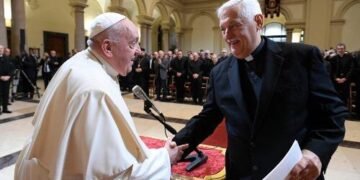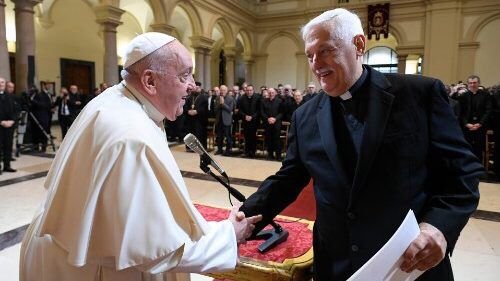By Charles Igwe
On November 5, Pope Francis visited the Pontifical Gregorian University, a historic Jesuit institution that recently merged with the nearby Pontifical Biblical and Oriental Institutes. During his address to the faculty, staff, and students, he emphasized a commitment to humility, intellectual curiosity, and unity in Catholic education.
Recalling a sign from the 16th century that once hung on the door of a Jesuit house in Rome, the Pope pointed to its inscription—“School of grammar, humanities, and Christian doctrine”—as a symbol of integrating religious sciences with the humanities. This combination, he said, serves as an invitation to “humanize the religious sciences” and rekindle the “spark of grace in what is human.”
The Pope highlighted the Jesuits’ tradition of providing education for free, underscoring that “gratuitousness opens us to the surprises of God.” Such generosity, he explained, “educates without manipulation, delights in growth, and nurtures imagination.”
Pope Francis also spoke on the importance of humility, challenging a past tendency for “sacred sciences to look down on others” in an “us vs. them” mindset, which led to “many mistakes.” In today’s world, he insisted, Catholic educators must be humble, admitting that no one holds all the answers in a complex, interconnected world. “Teachers in the Church need to acknowledge that we do not know everything,” he stated, calling for universities where “everyone is a beggar for knowledge, engaged in a collective search for understanding.”
The Pope hoped that the recent merger at the Gregorian would not be seen as “mere administrative restructuring” but as a renewed mission to address global and ecclesial challenges. He urged university staff to maintain a broader vision, reminding them to question “where you are going and why,” while keeping sight of the horizon.
Pope Francis’s call for humility, intellectual collaboration, and openness to change aims to inspire a new chapter in Catholic scholarship, grounded in service and unity.











































